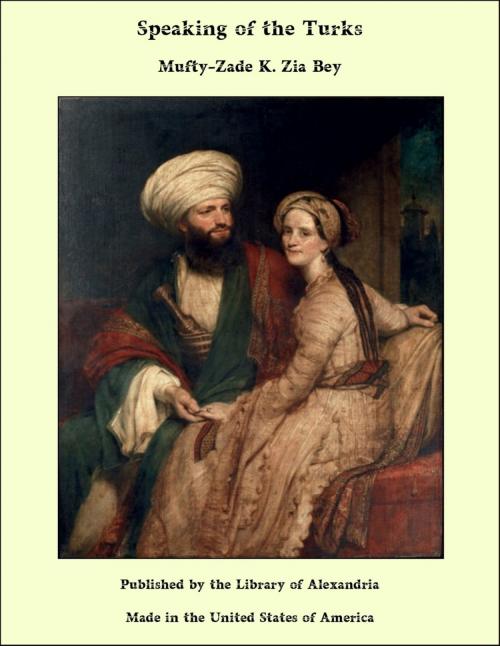| Author: | Mufty-Zade K. Zia Bey | ISBN: | 9781465612885 |
| Publisher: | Library of Alexandria | Publication: | March 8, 2015 |
| Imprint: | Language: | English |
| Author: | Mufty-Zade K. Zia Bey |
| ISBN: | 9781465612885 |
| Publisher: | Library of Alexandria |
| Publication: | March 8, 2015 |
| Imprint: | |
| Language: | English |
WE were arriving at Constantinople, my native city, from which I had been absent nearly ten years. I had been in America all this time. At first my business interests and later the general war had prevented my coming back to my own country even on a visit. I was of military age and Turkey was under blockade. When I had left Constantinople a few years after the Turkish revolution, the whole country was exhilarated, filled with joy, with ambition and with hope. Freedom and emancipation from an autocratic domination had been obtained. Nothing was to prevent the normal advance of Turkey and the Turks along the road to progress. We were at last to obtain full recognition as a civilized nation. We were at last to receive equal treatment from the other European nations. But, alas, during the following years the gods decided otherwise. Long, interminable wars either waged or fomented by neighbouring enemies had hampered the progress of Turkey. First in Tripolitania, then in Arabia and Albania, then again in the Balkans and finally during the general war the Turkish nation had been nearly bled to death and now I was returning to my country, and my native city was groaning under a domination a thousand times worse even than autocracy: the domination of victorious foreign countries Yet I was elated; homecoming is always exciting and the entrance to Constantinople by boat is always intoxicating. Besides, I was newly married. My young bride—an American girl from New Orleans—was with me and I was anxious to show her my country so maligned by the international press. Our boat stopped at the Point of the Seraglio and a tug brought the Inter-Allied control on board. The ship's manifesto and the passports of all passengers had to be examined by the representatives of the foreign armies of occupation. I was the only Turk on board and my wife and I travelled of course on a Turkish passport. We had been obliged to obtain a special permit from the Inter-Allied authorities before we could even start home. I took my turn with my wife, in the line of passengers. We showed our passport to the officer in charge: he glanced at it and seeing it was Turkish, asked us to wait. Our passport was in perfect order, but I believe that just for the pleasure of humiliating a Turk the officer decided to examine everybody else's passport before mine, and kept me waiting till the last. An Italian friend of mine who happened to travel with us, stood near us to vouch for me in case of need. I was coming back to my own country and I might need the assistance of a foreigner! Poor Turkey, what had happened to you! Poor Turks, what had become of our illusions of ten years ago which made us believe that being at last a free and democratic country we would be recognized as a civilized nation, and would receive equal treatment from the other European nations. Our hopes were being systematically trampled under the spurred heels of foreigners, whose one desire seemed to be to eradicate for ever even our self-respect, the better to destroy our freedom, the better to hamper our march toward progress, the better to annihilate our national independence!
WE were arriving at Constantinople, my native city, from which I had been absent nearly ten years. I had been in America all this time. At first my business interests and later the general war had prevented my coming back to my own country even on a visit. I was of military age and Turkey was under blockade. When I had left Constantinople a few years after the Turkish revolution, the whole country was exhilarated, filled with joy, with ambition and with hope. Freedom and emancipation from an autocratic domination had been obtained. Nothing was to prevent the normal advance of Turkey and the Turks along the road to progress. We were at last to obtain full recognition as a civilized nation. We were at last to receive equal treatment from the other European nations. But, alas, during the following years the gods decided otherwise. Long, interminable wars either waged or fomented by neighbouring enemies had hampered the progress of Turkey. First in Tripolitania, then in Arabia and Albania, then again in the Balkans and finally during the general war the Turkish nation had been nearly bled to death and now I was returning to my country, and my native city was groaning under a domination a thousand times worse even than autocracy: the domination of victorious foreign countries Yet I was elated; homecoming is always exciting and the entrance to Constantinople by boat is always intoxicating. Besides, I was newly married. My young bride—an American girl from New Orleans—was with me and I was anxious to show her my country so maligned by the international press. Our boat stopped at the Point of the Seraglio and a tug brought the Inter-Allied control on board. The ship's manifesto and the passports of all passengers had to be examined by the representatives of the foreign armies of occupation. I was the only Turk on board and my wife and I travelled of course on a Turkish passport. We had been obliged to obtain a special permit from the Inter-Allied authorities before we could even start home. I took my turn with my wife, in the line of passengers. We showed our passport to the officer in charge: he glanced at it and seeing it was Turkish, asked us to wait. Our passport was in perfect order, but I believe that just for the pleasure of humiliating a Turk the officer decided to examine everybody else's passport before mine, and kept me waiting till the last. An Italian friend of mine who happened to travel with us, stood near us to vouch for me in case of need. I was coming back to my own country and I might need the assistance of a foreigner! Poor Turkey, what had happened to you! Poor Turks, what had become of our illusions of ten years ago which made us believe that being at last a free and democratic country we would be recognized as a civilized nation, and would receive equal treatment from the other European nations. Our hopes were being systematically trampled under the spurred heels of foreigners, whose one desire seemed to be to eradicate for ever even our self-respect, the better to destroy our freedom, the better to hamper our march toward progress, the better to annihilate our national independence!















